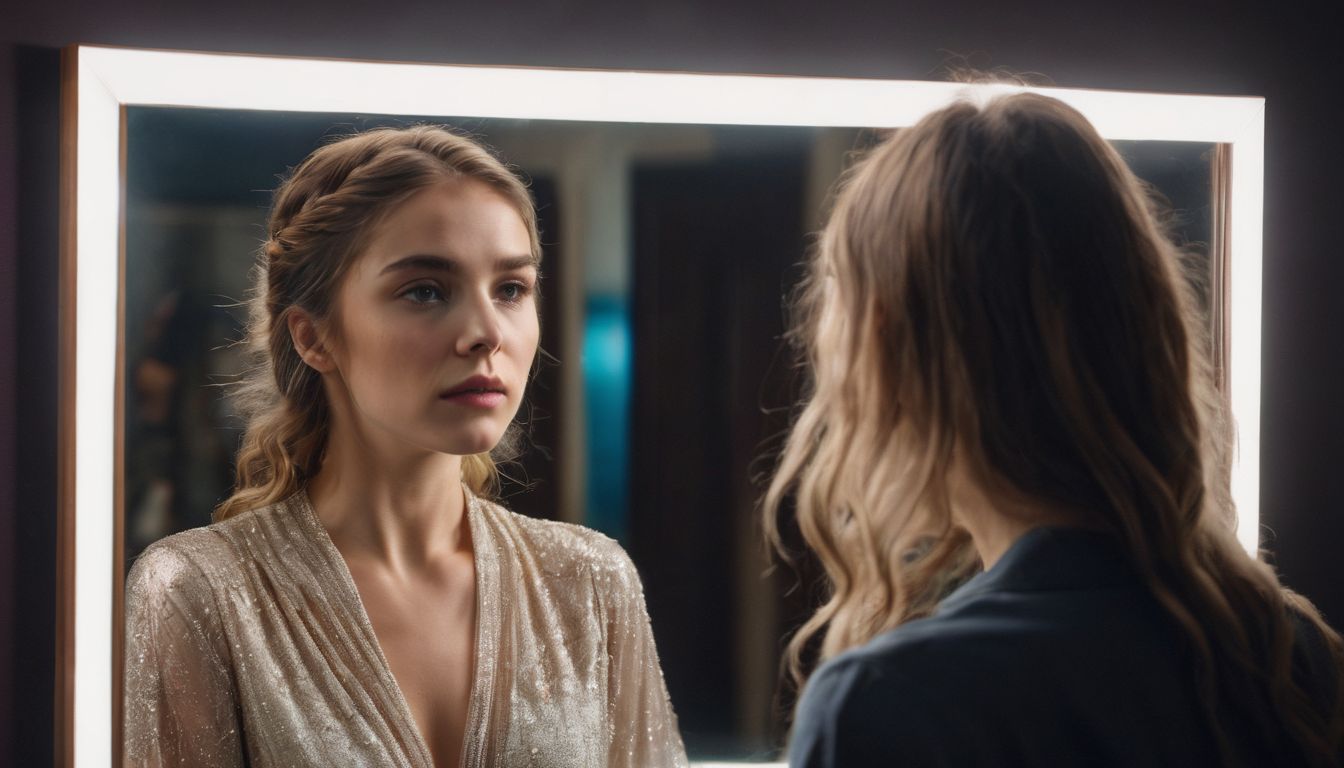
Are you noticing more hair in your brush than usual? A lack of key vitamins could be to blame for that unwanted shedding. Our guide will dive into the essential nutrients your locks crave and show you how to stop hair loss in its tracks.
Keep reading – healthier hair awaits!
Key Takeaways
- Vitamins like C, D, E, Biotin, and Iron are crucial for hair strength and growth; a deficiency in any of these can lead to hair loss.
- Adequate intake of vitamins through a balanced diet or supplementation is essential to prevent thinning, shedding, and maintaining overall scalp health.
- Topical application of certain vitamins directly onto the scalp may benefit those experiencing hair loss due to vitamin deficiencies.
- Persistent hair issues should prompt a consultation with a healthcare provider for proper assessment and treatment strategies.
- Hair loss from vitamin deficiencies can often be reversed by correcting the specific lacking nutrients.
The Importance of Vitamins for Hair Health

Moving beyond the basics, let’s delve into the crucial role that vitamins play in maintaining hair health. Just like every part of our body, hair needs a variety of nutrients to grow and stay strong.
Vitamins act like building blocks for your locks, each serving its unique function. Vitamin C, for instance, is vital for collagen production—a protein that fortifies the hair structure.
A lack of this vitamin can lead to brittle strands prone to breakage.
Vitamins such as B7 (biotin) and others in the B complex family are essential for metabolism and energy production—processes necessary for healthy cell growth including those in hair follicles.
Without these key nutrients, you might notice slower hair growth or even thinning of your mane over time. It’s not just about keeping what you have; it’s also about promoting the continuous generation of new, robust strands that give your hairstyle volume and vitality.
Linking Vitamin Deficiencies to Hair Loss

Understanding how essential vitamins are for maintaining luscious locks, we can now explore the direct link between insufficient nutrients and hair woes. Research pinpoints that not getting enough of certain vitamins can trigger various forms of alopecia—a medical term for hair loss.
A lack of these key micronutrients often leads to weakened strands, diminished growth, and in some cases, bald patches where hair refuses to grow back. For instance, vitamin D plays a critical role in stimulating new and old hair follicles.
When you’re low on vitamin D, your hair may start to thin or even stop growing entirely.
Vitamin deficiencies sneak up quietly but their impact speaks volumes on scalp health. Iron deficiency is another common culprit behind chronic shedding; it’s vital for carrying oxygen to cells – including those responsible for healthy hair growth.
And let’s not overlook biotin (vitamin B7), famed for its role in keeping our tresses thick and strong—without it, people might notice more hair collecting in their shower drain than usual.
Folic acid is yet another building block that if missing from your diet could be causing harm unseen until it manifests as sparse or fragile hairs atop your head. Recognizing these connections helps us take proactive steps toward restoring vitality both inside our bodies and out through our gleaming manes.
Key Vitamin Deficiencies That Can Lead to Hair Loss

Vitamin D, Vitamin A, Vitamin E, Vitamin C, Folic Acid, Biotin, Zinc, Vitamin B6, Iron and Essential Fatty Acids are all essential for maintaining healthy hair. To learn more about how these deficiencies impact hair health and what you can do to prevent them, keep reading.
Vitamin D
Sunlight doesn’t just brighten our days; it also plays a crucial role in the health of our hair. Our bodies need vitamin D to create new follicles—the tiny pores where new hair can grow.
Without enough vitamin D, hair may become thin and brittle, leading to excessive shedding or even premature graying. Those struggling with conditions like androgenetic alopecia or telogen effluvium might find their situation worsens if they don’t maintain adequate levels of this essential nutrient.
To keep your locks luscious, consider adding a daily dose of sunshine by spending short periods outdoors safely. You can also eat foods rich in vitamin D such as fatty fish or fortified products, take supplements if necessary, and be aware of any medications that could lower your natural supply of this critical vitamin for hair vitality.
Next on the list is another key player in maintaining healthy tresses: Vitamin A.
Vitamin A
While Vitamin D is crucial for hair follicle cycling, Vitamin A plays its own vital role in maintaining healthy hair. This fat-soluble vitamin aids in the production of sebum, an oily substance secreted by your scalp that keeps hair moisturized and shiny.
Too little of it, however, can lead to a dry scalp with thinning hair and more visible dandruff flaking.
Your body needs just the right amount of Vitamin A to support cell growth, including the cells that make up your hair. An imbalance either way—too much or too little—can cause issues like increased shedding and slower regrowth periods.
Keeping your intake balanced primarily through foods rich in this nutrient will help keep your locks luscious and reduce potential thinning associated with deficiency.
Vitamin E
Moving on to another essential vitamin for hair health, let’s focus on Vitamin E. This vital nutrient plays a crucial role in maintaining healthy hair by reducing oxidative stress in the scalp, which is associated with hair loss.
Vitamin E deficiency can result in increased hair shedding, progressive thinning, and dry, damaged strands. Low levels of vitamin E are often observed in individuals with autoimmune diseases like psoriasis or alopecia areata, further highlighting its significance for overall hair health.
Vitamin C
Vitamin C is crucial for collagen production, which plays a vital role in healthy hair growth. Additionally, it aids in iron absorption, supporting the overall health of your hair.
Foods rich in vitamin C such as lemons, oranges, bell peppers, strawberries, tomatoes, broccoli, and cauliflower can help ensure you’re getting an adequate intake of this essential nutrient for maintaining strong and healthy hair.
Ensuring that your diet includes these foods can help prevent a deficiency in vitamin C and support optimal hair health.
Folic Acid
Folic acid is a crucial nutrient for promoting healthy hair growth and preventing hair loss. A deficiency in folic acid has been linked to hair loss, making it an important vitamin to include in a well-balanced diet or as a supplement.
Research suggests that folic acid deficiency can lead to weakened hair follicles and hinder the production of new cells, which are essential for maintaining strong and healthy hair.
Consuming folate-rich foods such as leafy greens, chickpeas, and soy products can help increase folic acid levels, supporting overall hair health.
Biotin
Moving on from the importance of folic acid, another crucial vitamin for hair health is biotin. Biotin deficiency can lead to hair thinning and shedding due to its role in keratin production, the primary protein that makes up our hair.
In fact, low levels of biotin have been associated with male pattern baldness.
Consuming biotin-rich foods or supplements can help correct this deficiency. Experts recommend a daily intake of 2.5-5 mg of biotin for addressing hair loss issues. However, it’s essential to consult a healthcare provider to confirm if there is a true biotin deficiency before supplementing with it.
Zinc
Moving on from the importance of biotin, let’s talk about zinc. Zinc deficiency is linked to hair loss, dry and dull strands, and changes in hair texture. This essential mineral plays a crucial role in healthy hair growth and overall hair health.
Inadequate levels of zinc can lead to male pattern hair loss, female pattern baldness, telogen effluvium, and alopecia areata as it is necessary for healthy hair follicle cell growth and division.
Including zinc-rich foods in your diet or taking the right dosage of supplemental zinc daily under medical supervision can help correct this deficiency.
Vitamin B6
Vitamin B6 plays a crucial role in preventing key vitamin deficiencies that can lead to hair loss. It supports the body’s production of hemoglobin, which carries oxygen to the hair follicles and scalp.
Additionally, it aids in regulating hormones that influence hair growth and overall health. Foods rich in Vitamin B6 include poultry, fish, organ meats, potatoes, and non-citrus fruits.
Furthermore, a deficiency in Vitamin B6 may contribute to hair thinning and loss due to its impact on red blood cell production and hormone regulation. Therefore, ensuring an adequate intake of Vitamin B6 is essential for maintaining healthy hair growth and preventing potential deficiencies that could lead to hair loss.
Iron
Iron is crucial for maintaining healthy hair as it plays a vital role in the production of collagen, an essential protein for strong and vibrant hair. A deficiency in iron can lead to hair thinning, dullness, dryness, changes in texture, and excessive shedding.
Additionally, iron deficiency has been associated with male pattern baldness, female pattern hair loss, alopecia areata, and telogen effluvium.
Ensuring an adequate intake of iron through diet or supplements is imperative for promoting healthy hair growth and preventing these adverse effects on your locks. By incorporating iron-rich foods such as lean meats, lentils, spinach, and fortified cereals into your diet or taking iron supplements as recommended by a healthcare provider if deficient in this vital mineral can help maintain optimal hair health.
Essential Fatty Acids
Having addressed the impact of iron on hair health, it’s essential to recognize the significance of another crucial nutrient: essential fatty acids. Omega-3s are particularly vital for a healthy scalp environment, playing a key role in preventing dryness, itchiness, and brittle hair.
Deficiency in omega-3 can lead to adverse effects on scalp health and hair quality. To correct this deficiency, individuals can incorporate sources of omega-3 into their diet such as fish oil capsules, salmon, walnuts, and flaxseeds or consider supplements.
Incorporating omega-3s into your diet or supplementation routine is fundamental for maintaining a healthy scalp environment and promoting optimal hair condition. Omega-3 deficiency can contribute to unwanted symptoms such as dryness and brittleness while addressing these deficiencies through diet or supplements can help prevent these issues from arising.
How These Deficiencies Impact Hair Health

Vitamin deficiencies can have a significant impact on hair health, leading to issues such as excessive shedding, slow growth, thinning, dull and dry strands, changes in texture, and even patchy hair loss.
For instance, inadequate levels of vitamin D can result in dry and brittle hair, along with excessive shedding and premature graying. Similarly, insufficient vitamin E may lead to increased hair shedding, progressive thinning of the hair, and damage to the strands causing them to become dry.
Furthermore, low levels of biotin (vitamin B7) can contribute to problems like hair loss, brittle and thinning hair strands that lack luster. It is essential for individuals to understand how crucial these vitamins are for their overall well-being including the health of their hair.
By ensuring adequate intake of these vital nutrients through a balanced diet or supplements when necessary could help prevent or alleviate these detrimental effects on one’s tresses.
Preventing Vitamin Deficiencies
Maintaining a balanced diet, taking dietary supplements, and using topical vitamins and minerals can help prevent vitamin deficiencies for healthier hair. To learn more about how to maintain optimal vitamin levels for healthy hair growth, keep reading!
Balanced Diet
A balanced diet rich in fruits, vegetables, whole grains, lean proteins, and healthy fats is crucial for maintaining optimal levels of vitamins and minerals that support hair health.
Incorporating a variety of foods from all food groups ensures an adequate intake of essential nutrients such as Vitamin A, C, E, D, Biotin, Zinc, Iron, and Omega-3 fatty acids. Including these nutrients in your diet supports overall wellness and can help prevent vitamin deficiencies that may contribute to hair loss.
Consuming a diverse range of nutrient-dense foods not only supports the body’s nutritional needs but also promotes healthy hair growth. Additionally, it helps maintain the proper functioning of bodily systems which are vital for preventing common issues like excessive shedding or changes in hair texture.
Supplements
Transitioning from balanced diet to supplements, it’s important to consider that sometimes the nutrients we need for healthy hair may not be obtained in sufficient quantities through our diet alone.
In such cases, incorporating supplements can help address specific deficiencies and promote hair health. Key supplements such as Vitamin D, A, E, B12, folic acid, zinc, iron, Omega-3 fatty acids, and Vitamin C play a crucial role in preventing hair loss related to nutrient deficiencies.
When it comes to using supplements for promoting hair growth and combating deficiency-related hair loss, consulting with a healthcare provider is essential to ensure proper dosage and effectiveness.
Topical Vitamins and Minerals
As an alternative to oral supplements, applying topical vitamins and minerals directly to the scalp can be beneficial for hair health. Vitamin E, when applied topically, can help reduce oxidative stress which may contribute to hair loss.
Additionally, topical application of vitamin C promotes collagen production which strengthens hair follicles and supports healthy growth. Furthermore, minerals like zinc and iron can be effectively absorbed through the scalp and play a crucial role in promoting strong and lustrous hair.
Using topical vitamins and minerals has been found to be an effective way to target specific areas of concern on the scalp. For example, vitamin D applied topically helps in maintaining healthy follicle cycles while biotin works directly at the root level by improving keratin infrastructure for better hair quality.
When to Consult a Healthcare Provider
If you notice persistent hair problems like excessive shedding, dullness, and texture changes, it’s crucial to seek guidance from a healthcare professional. Additionally, if you experience unexplained symptoms such as extreme fatigue, muscle weakness, or mood changes alongside hair issues, consulting a healthcare provider is essential for a comprehensive assessment and personalized treatment plan.
Suffering from signs of vitamin deficiencies like brittle hair, premature graying, or prolonged regrowth periods should prompt you to consult with a healthcare expert.
Frequently Asked Questions
Wondering what vitamins are best for preventing hair loss? Want to know if low B12 can lead to hair loss? Find answers to these questions and more in our FAQ section.
What is the best vitamin for hair loss?
Zinc is considered one of the best vitamins for hair loss. It plays a vital role in hair tissue growth and repair, keeping the oil glands around the follicles functioning optimally.
Low levels of zinc have been linked to hair loss, making it essential for maintaining healthy locks. In addition, vitamin A is crucial for promoting a healthy scalp and adequate sebum production to prevent hair from becoming dry and brittle, ultimately reducing the risk of breakage.
Can low B12 cause hair loss?
Moving on from discussing the best vitamin for hair loss, it’s important to understand that low levels of B12 can be a contributing factor to hair loss. Vitamin B12 plays a crucial role in the production of healthy red blood cells, which carry oxygen to the scalp and hair follicles.
Inadequate levels of this vitamin can lead to poor oxygen supply, resulting in hair follicle damage and eventually hair loss. Additionally, low levels of B12 can cause premature graying as well.
Therefore, ensuring sufficient intake of vitamin B12 through diet or supplements is essential for maintaining healthy hair growth.
How much biotin should I take for hair loss?
To address hair loss, considering the recommended biotin intake is crucial. For individuals grappling with hair loss issues, experts generally advise a daily dosage of 2.5-5 mg of biotin to promote healthy hair growth and prevent further thinning or shedding.
However, it’s essential to emphasize consulting a healthcare provider before supplementing with biotin to ensure there’s a genuine deficiency that necessitates supplementation. Prompt treatment is vital in minimizing potential permanent damage to the hair follicles caused by low levels of biotin.
Ultimately, proper assessment by a doctor can determine if biotin supplementation is necessary and beneficial for addressing hair loss concerns due to its significant impact on healthy hair growth.
Does hair loss from vitamin deficiency grow back?
Hair loss from vitamin deficiency can indeed grow back with the appropriate treatment. By addressing the specific vitamin deficiency through targeted supplements or dietary changes, individuals may experience regrowth of their hair.
In fact, restoring adequate levels of essential vitamins and minerals is often effective in reversing the hair loss caused by these deficiencies.
With tailored treatment plans, many people have seen positive results in regrowing their hair after experiencing vitamin-related hair loss.
Conclusion
In conclusion, understanding the link between vitamin deficiencies and hair loss is crucial for maintaining healthy hair. Proper nutrition and a balanced diet rich in essential vitamins are essential for preventing potential deficiencies that can lead to various hair health issues.
By being proactive about ensuring adequate vitamin intake, individuals can significantly impact their overall hair health and reduce the risk of experiencing unwanted changes in hair texture, excessive shedding, or dullness.
Staying informed about the role of vitamins in maintaining vibrant, strong hair is key to promoting long-term scalp and follicle health.
FAQs
1. Can not having enough vitamins really make my hair fall out?
Yes, not getting enough of certain vitamins, like vitamin D, B vitamins (like vitamin B12), and iron can lead to hair loss because they play a key role in keeping your hair healthy.
2. What should I eat to stop my hair from falling out due to vitamin deficiency?
To help stop hair loss, you should eat a healthy diet full of vitamin C-rich foods, antioxidants that support the immune system, and a good mix of other nutrients found in multivitamins or omega-3 supplements.
3. Does taking extra vitamins cure hair loss if it’s already happening?
Taking specific vitamins might help with hair loss if it’s caused by nutritional deficiencies like low levels of folate or selenium; however, always talk to a nutritionist before starting any new vitamin regimen.
4. Will using things like minoxidil foam or finasteride fix my vitamin-related hair problems?
Minoxidil foam and finasteride are treatments for certain types of baldness but won’t fix underlying nutritional deficiencies—eating right and possibly taking supplements will address those issues better.
5. If I have diabetes or thyroid problems, could this be why I’m losing my hair?
Diabetes and issues with thyroid hormones can indeed affect your hair—they may cause changes in texture or even lead to loss so it’s important to manage these conditions alongside checking for nutritional deficiencies.
6. Are there side effects from acne medications that could also cause me to lose my hair?
Some strong acne medications can have side effects that include affecting your nutrient absorption which might result in thinning hairs—always discuss potential side effects with your doctor when prescribed such medications.
